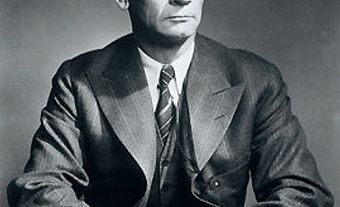Roblin, Dufferin
Dufferin "Duff" Roblin, businessman, politician, premier of Manitoba 1958-67 (b at Winnipeg 17 June 1917; d there 30 May 2010). After attending U Man and U of Chicago and wartime service in the RCAF, "Duff" Roblin first won election to the Manitoba legislature in 1949 as an Independent Conservative for the riding of Winnipeg S. Grandson of Sir Rodmond P. Roblin, the province's vigorously partisan premier 1900-15, he challenged the avowedly nonpartisan government of Douglas Campbell, and after extricating the Conservatives from the government coalition in 1951, won the party leadership in 1954 and defeated the Campbell government in 1958.
The Roblin administration was one of the most active in Manitoba history, upgrading highways, creating provincial parks, building the Greater Winnipeg Floodway (derided at the time as "Duff's Ditch"), modernizing hospitals and welfare agencies, consolidating schools and expanding postsecondary facilities, restoring the use of French in education and initiating a shared services program for private schools, promoting urban renewal, coordinating Winnipeg's municipalities with a metropolitan structure, launching northern power and mining projects and establishing numerous agencies to assist private economic development.
On this record his government won re-election in 1959, 1962 and 1966. In Nov 1967 Roblin resigned as premier to contest the federal leadership of the PC Party, but lost to Robert Stanfield. In the 1968 federal election he was defeated in Winnipeg S Centre, a casualty of "Trudeaumania." After a term as executive with Canadian Pacific Investments, he established a security firm in Winnipeg.
In 1978 he was appointed to the Senate, where he served on committees considering constitutional and Senate reform. On the latter, he proposed that the Senate be elected. In Sept 1984 Roblin was appointed to the Mulroney Cabinet as government house leader in the Senate. He held this position until his voluntary resignation in 1986, and his Senate seat until the mandatory retirement in 1992 at age 75. Roblin is significant as an exponent of classic conservatism, in the John A. Macdonald tradition, advocating an active government role in social reform. His service to Canada was honoured with his being named Companion of the Order of Canada in 1970, and numerous landmarks in Manitoba bear his name.

 Share on Facebook
Share on Facebook Share on X
Share on X Share by Email
Share by Email Share on Google Classroom
Share on Google Classroom

